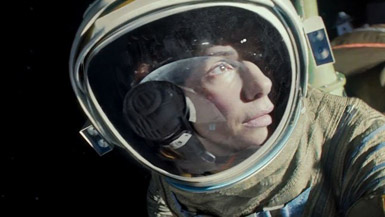Movie Review: Gravity
By Matthew Huntley
October 9, 2013
BoxOfficeProphets.com

That’s the gist of the plot, and once the movie establishes it, it never leaves the astronauts’ side (to cut away to Earth, for example), developing into a terse, formidable thriller that earns its effect simply by observing the characters in their given situation, more or less in real time. And while we’ve seen movies like this before (at sea in Open Water; in the desert with Flight of the Phoenix; and even in space with Apollo 13, although the characters’ circumstances and struggles were different), rarely has one been this cinematic.
The two main astronauts are Dr. Ryan Stone (Sandra Bullock) and Matt Kowalski (George Clooney). Dr. Stone is a rookie and only has six months of NASA training under her belt. She assumed their current mission would be quick and painless since it only involved her upgrading a telescope. When Kowalski asks her what’s her favorite part about being 600 km above the Earth, she says, “I like the silence.”
But her feelings of peace and tranquility quickly fade when she and Kowalski receive word from Houston’s mission control (the voice of Ed Harris) that debris from another satellite is coming toward them at 50,000 miles per hour. By the time they decide to abort their mission, remnants have already begun colliding with them and their space shuttle, causing Dr. Stone to become untethered and sent off into the far reaches of space alone. With her oxygen levels dropping and distance increasing, she starts to panic and loses communication with Kowalski.
Where things go from here, I will not say, and luckily this is as far as the previews went. For once, whoever cut the trailer knew a film like Gravity, and all films for that matter, benefits from viewers not knowing where it’s going ahead of time.
What I will say is that Gravity, in its most basic form, is about humans beings thrown into an unthinkable and dire situation, the kind where anxiety, nerves and fear collectively work together to try to get the best of us and threaten not only our survival but our will to survive. This isn’t a story about people afraid of losing their loved ones, their jobs, or their credibility, but their very lives. How often can we say we actually experience this fear in real life? Gravity makes it manifest.
I know what you’re thinking - so many movies are about human survival and our fear of dying, but the circumstances in Gravity, not to mention the way it’s made, make it that much more palpable and gut-wrenching. They’re so extreme, in fact, the characters, and consequently the viewers, start to believe everything is outside of their control. As the walls of doubt and despair close in, it would almost be easier to succumb to them than to think of a way out.
Cuarón and his co-writer Jonás Cuarón, who happens to be the director’s son, know this, and their knowledge allows Gravity to reach an uncommon level of intensity. It’s also able to generate a lot of empathy from the audience because it shows humans pitted against nature and themselves, facing an outlook that feels overwhelmingly bleak and absolute. This can be one of the scariest and most unnerving feelings any cognizant creature can endure, and Gravity is not only entertaining as a result, but serves as a stark reminder that we should be grateful we don’t feel this way most of our lives.
What also makes Gravity unique are its pure cinematic qualities. The fact that it takes place in space shouldn’t (and doesn’t) change its underlying visceral effects, which can be felt in any environment, but it certainly enhances the overall movie-going experience. Cuarón is a natural born filmmaker, and I can only imagine how giddy he must have been to shoot in 3D, use green screen technology, move his camera every which way, and adorn the film with lots of special effects. It’s incredibly visual and often breathtaking in scope, traits that a lesser filmmaker might have allowed to overshadow the tension and reduce the film to a technical exercise, albeit an exceptional technical exercise. But Cuarón is careful not to let this happen. Amidst all the technical achievements, the simple story keeps us focused and wondering how it’s going to end.
With all this said, and despite my high admiration for Gravity, the film is not perfect. Like I mentioned, similar stories have been told before, and though they might not have been as technically riveting, they’ve had better, richer character development, which raised the emotional stakes and our investment in the story. The characters in Gravity are flushed out only minimally, and even though the focus is on their given situation and not their life stories, the screenplay could have come up with better ways of characterizing them that didn’t feel as forced or standard (again, I hesitate to reveal anything). That’s not to say Bullock and Clooney don’t get the job done acting-wise, but imagine if the movie didn’t press the same old emotional buttons just for the sake of giving it emotion. It probably would have been a masterpiece.
What Gravity becomes, then, is a superbly crafted but only moderately poignant thriller - one we admire greatly on a technical level even though it doesn’t linger in our hearts as long as we had hoped. Still, what does give me hope is other ambitious filmmakers like Cuarón will see Gravity and an instauration of the cinema will take place, one in which a whole slew of films will be made with the power to physically and mentally stir us, making the very act of watching movies that much more experiential.